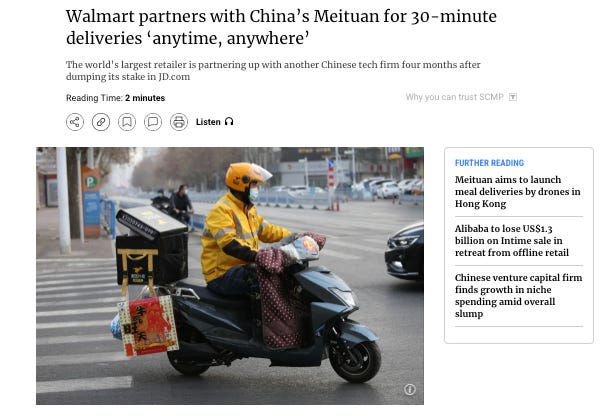Brief Interlude: The Shifting Battle for Speed in Chinese E-Commerce
The future of Chinese e-commerce is instant retail
Walmart’s Shift to Meituan and the Future of Instant Retail in China
In China’s fast-paced e-commerce market, speed is the name of the game. Walmart’s recent move from JD.com to Meituan—offering 30-minute delivery—shows a major shift in consumer expectations.
As delivering products in 24 hours becomes as standard as having a checkout button, instant retail is emerging as the true competitive frontier.
The Decline of 24-Hour Delivery as an Advantage
JD.com’s once-unbeatable 24-hour delivery is no longer a competitive edge. 24-hour 快递 delivery in China is commoditized. Today, consumer preferences have shifted toward two distinct categories:
• Immediate Needs: Platforms like Meituan offer ultra-fast delivery within 30 minutes, catering to those who need products urgently.
• Cost-Conscious Purchases: Platforms like Pinduoduo prioritize low prices over speed, attracting shoppers who can afford to wait a day or two to save money.
JD’s traditional logistics model now struggles to stand out. A 24-hour delivery window is no longer the sweet spot—it’s too slow for urgent needs and offers no advantage when timing isn’t critical. Walmart’s shift to Meituan highlights this trend: speed now needs to be nearly instantaneous to stay competitive.
Why Instant Retail Represents the Future
Instant retail changes both shopping habits and supply chains. Meituan, originally built around on-demand food delivery, now handles groceries, electronics, and more. Its Q3 2024 earnings call highlights this shift:
• Expected instant retail GMV exceeding RMB 200 billion by 2027.
• Daily InstaShopping orders topping 10 million in Q3.
This shows that leveraging a vast rider network and localized warehouses pays off, making “blink-and-it’s-here” delivery the new standard.
Meituan’s Key Advantages
Several factors set Meituan’s instant retail model apart:
1. Massive Rider Network: Millions of riders swiftly deliver items, and this speed is still not commoditized like standard parcel delivery. (That’s why I never believed the stories about Alibaba divesting its instant delivery platform, Ele.me, despite its struggles with profitability. The rider network is an irreplaceable asset, valuable even if it operates at a loss.)
2. Localized Warehousing: Over 30,000 front-end warehouses ensure products are always nearby, cutting delivery times dramatically.
3. Data-Driven Inventory: The Qianniuhua system helps manage stock efficiently, reducing shortages and waste.
4. Lifestyle Integration: Consumers now rely on immediate delivery for daily needs. I can’t even recall where the nearest supermarket is because Meituan delivers everything. I order from Meituan daily. From 7 a.m. to 10 p.m., there’s literally not a single minute when I look out the window and don’t see a Meituan driver. It’s so ingrained in the consumer mindset already that I once caught myself waving at a Meituan driver as if he were an old friend. I can’t wait until they finally roll out drone delivery in Shanghai like they already have in Shenzhen.
Challenges for Instant Retail
Instant retail isn’t without its complications:
1. Complex Inventory Management: Maintaining stock across multiple small warehouses is like playing 3D chess.
2. Profitability Pressures: Ultra-fast delivery is expensive. White-label products help margins, but costs remain high.
3. Category Expansion: Groceries move quickly, but low-frequency goods like electronics and apparel are harder to manage due to different demand patterns.
Walmart and Miniso: Validating the Model
Walmart’s decision to list all its stores on Meituan’s Shangou (闪购) service for 30-minute delivery—and Miniso integrating over 500 stores into Meituan InstaMarts—confirms that retailers trust Meituan’s approach. This shift goes beyond food and groceries, extending into electronics, apparel, and home goods. While JD currently dominates high-value categories, the lure of instant delivery could tempt even premium brands over time.
Conclusion
Walmart’s pivot to Meituan marks a turning point. As traditional delivery speeds become less impressive, instant retail takes center stage. Meituan’s investments, technology, and partnerships put it at the forefront of this rapid evolution. Though inventory complexity and tight margins persist, the direction is clear: the future belongs to those who deliver not in hours, but in minutes. In China, that future is arriving right now.



Great article! Do you think JD will lose out in the e-commerce race? It sounds like they’re struggling to stay competitive, especially with 24-hour delivery no longer being a differentiator. Curious to hear your thoughts!
Similar trend is happening in India.